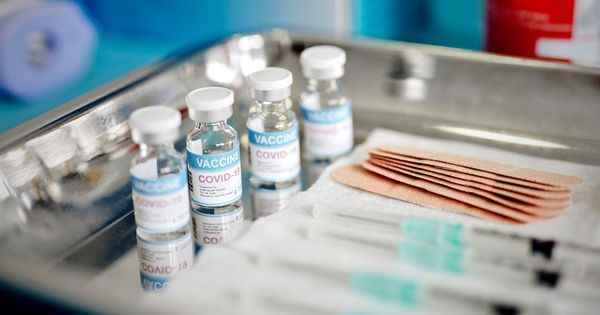Posted on 11/09/2021
2 min read
The Haute Autorité Santé confirms the higher risk of myocarditis with the Moderna vaccine in children under 30, to whom it is now not recommended.
Suspected risks of myocarditis and pericarditis with the vaccine Moderna (Spikevax) were confirmed. On November 8, 2021, the Haute Autorité de Santé announced in a press release that the Moderna vaccine against Covid-19 is now not recommended for those under 30 years of age.
The health authority is based on a study by Epi-Phare in association with the Health Insurance and the ANSM carried out using data from the National Health Data System (SNDS). The goal: to verify the hypotheses already suggested by several studies, and highlighted by the WHO, on a higher risk of myocarditis and pericarditis with Moderna (Spikevax) than with Pfizer (Cominarty), in particular in men aged 18 to 29 years. with a complete vaccination schedule.
Higher risk increased with Moderna than Pfizer
The benchmark study taken to confirm the restriction decision relates to “all people aged 12 to 50 hospitalized in France for myocarditis or pericarditis between May 15 and August 31, 2021, ie 919 cases of myocarditis and 917 cases of pericarditis”, reports the ANSM. A total of 9190 people were studied on the risk of myocarditis and 9170 on the risk of pericarditis. The comparison was made between vaccinated and unvaccinated people.
The results confirmed an increased risk with both Pfizer and Moderna vaccines, but, “This risk appears to be more marked in young men under the age of 30, in particular after the second dose of Spikevax, even if the number of cases appears infrequent in view of the high number of doses administered.”
Here’s what to remember from the results:
- The risk of additional myocarditis in men less than 30 years of age is estimated to average 132 cases per million doses administered.
- The risk of myocarditis is lower but also present in women under 30 years after the second dose up to 37 cases per million doses.
- The risk of pericarditis is estimated to be 18 cases per million doses in young men
In order to reassure patients, the ANSM adds that the study and the monitoring of patients show that the symptoms of myocarditis and pericarditis eventually disappear on their own or with treatment and that no death was reported during the period studied. The benefit-risk balance of the Spikevax vaccine still remains 90% favorable against severe forms of Covid-19, according to health authorities.
According to the ANSM, here are the signs that should still consult a doctor quickly:
- Shortness of breath
- Dyspnea
- Pain in the chest
- Palpitations
- Irregular heartbeat
Recognize the signs of myocarditis
The signs of myocarditis should lead to a consultation. The diagnosis of myocarditis is based on several examinations:
- clinical examination, “to check for signs of heart failure“;
- the electrocardiogram, “which can show modifications“the activity of the heart;
- the blood test, “who will be able to show signs of cardiac distress with the elevation of cardiac markers such as troponin, and a biological inflammatory syndrome“;
- cardiac MRI to truly establish the diagnosis of myocarditis.
Consult a general practitioner online
Recognize the signs of pericarditis
The chest pain is increased by deep inspiration, swallowing and lying down. She is relieved by the lean forward position. This pain may be suggestive of pleurisy or myocardial infarction.
.
dts1
